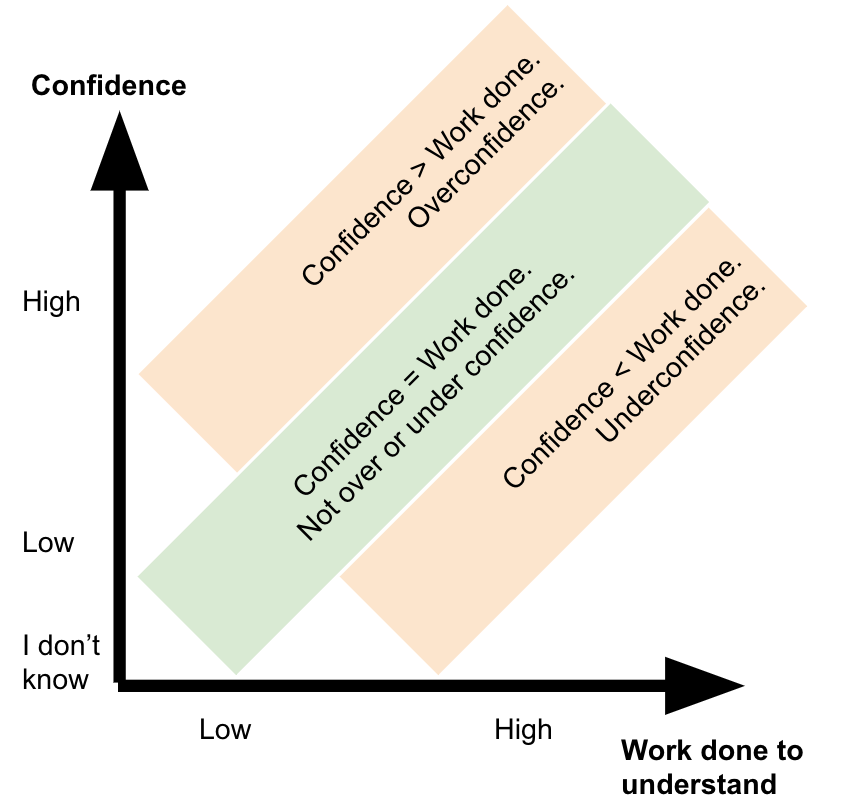Default answer: I don’t know.
Reading time: 5 mins
Summary: At work I think one wants to be as helpful as possible. Having a view on everything or acting in a confident way when you don’t know what you are doing; are two ways I’ve seen poor outcomes occur. To me, it’s not just ok to say ‘I don’t know’, I believe one's default answer should be ‘I don’t know’ unless you can explain why you have done the work to have high confidence.
Jingle: To say you know, when you don’t know, is a no no.
Taxonomy of confidence: The work required to have high confidence is high.
Levels:
Minimal confidence (Default ‘I don’t know’): I’ve only just started looking at this area, I have minimal confidence. My first impressions are X, Y & Z.
Low confidence: I have low confidence because I’ve only spoken to 3 customers, my views are A, B & C. After speaking to 10 customers I should have significantly increased confidence.
Medium confidence: I’ve spoken to 10 customers and reviews our products and competitors' products in detail, so I think I have medium confidence.
High confidence: I’ve spoken to 20 customers over the last 2 months, reviewed the quant usage data in depth and have a strong understanding of our and competing products. As such I believe I have the basis for a high confidence view.
Comment
The main point for me is that you start at ‘I don’t know’ and can slowly do the work to level up to ‘high confidence’ if you want. I don’t think it’s possible to somehow magically start at high confidence.
Also, I find it very useful to explicitly state confidence strength when putting forward an opinion. Without explicitly stated confidence strength it is easy to fall into the ‘Dunning Kruger overconfidence trap’.
++++++++
Details
IMO overconfidence is a much bigger problem than underconfidence.
Overconfidence problem type 1: Thinking that having high confidence in what you say at work is a way to have others have confidence in you.
Recommended: Having high confidence when you don’t have the basis for high confidence is a key way to have others lose confidence in you. Eg if you've never used a CRM before, acting like you know how to use one when rolling it out to the team to me doesn't make sense. It's likely in a job you'll be doing some things you don't know much about, acting like you know a lot about something you don't is IMO a core way to lose confidence with others.
Overconfidence problem type 2: Thinking you need to have an opinion on something so jumping to have a view almost immediately.
Recommended:
State the confidence you have in a view when you are saying it. EG I have low confidence as I’ve only seen Person A exhibit this once vs I have high confidence as I’ve seen Person A exhibit this 10 times.
“I never allow myself to have an opinion on anything that I don’t know the other side’s argument better than they do.” — Charlie Munger
Understand minimum two viewpoints and the pros and cons of each. First do Understanding Mode and then try to slowly level up to have a considered view.
Dunning Kruger = Over confidence
The Dunning-Kruger effect occurs when a person's lack of knowledge and skills in a certain area cause them to overestimate their own competence.
From my experience overconfidence is a bigger problem than underconfidence.
Overconfidence hurts others' view of you AND means you do silly things.
Underconfidence means you are less likely to do something you should, so mainly just harms you.
I think it’s best to state the confidence you have in something when you say it, this is a key way to ward off against ‘unknowingly being overconfident’.
Fake it till you make it?
I don’t think it’s ‘fake it till you make it’. But rather ‘never stop believing you can make it but confront the brutal facts head on.’
Brutal short term pragmatism with religious long term optimism.
Believe it(’s possible) otherwise you won't make it. But don't delude it, else you'll crash it.
One lens on what is needed to have high confidence:
Confidence level = 1. Job specific expertise * 2. Industry specific expertise * 3. Understanding of customers' needs (diagnosis) * 4. How well you prescribe (synthesis what to do)
E.G 1: Sales at Edrolo
1. Job specific expertise
How well do you get marketing for products, how well do you understand how to do research of clients needs in meetings, how well do you know how to explain things, etc. likely have models for how to do each of these areas well.
2. Industry specific expertise
E.G. How much do you know about education. E.G. Types of learning approaches for maths, what schools gov regulation needs are, etc
3. Understanding of customers' needs
How much research have you done and then synthesis to build empathy. E.G. customer meetings, in school observations, using Edrolo and other products.
4. How well you prescribe (synthesis what to do)
One model for complex sales is ‘Discover => Diagnose => Design => Deliver’
For this model I’d say that:
“Discover => Diagnose” = “1. Job specific expertise * 2. Industry specific expertise * 3. Understanding of customers' needs (diagnosis)”
“Design => Deliver” = “4. How well you prescribe (synthesis what to do)”
Related blogs:
If you only take away one thing
Saying ‘I don’t know’ doesn’t mean you add no value, done well it hopefully means you don’t add ‘negative value’.
Saying ‘I don’t know’ when you don’t know is adding as much value as you can at that point.
At work I believe one should be trying to add as much value as possible, so go and do the work to go from ‘no understanding / confidence / i don’t know’ to ‘high confidence’. Just don’t purport you have higher confidence than you actually do!


